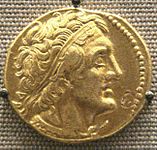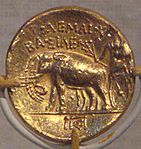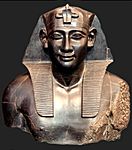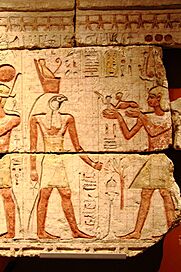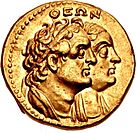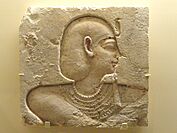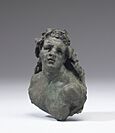Ptolemy I Soter facts for kids
Quick facts for kids Ptolemy I Soter |
|
|---|---|
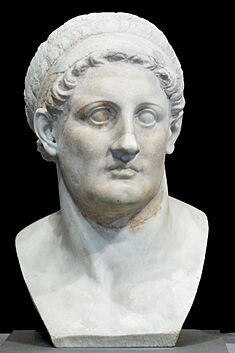
Bust of Ptolemy I, located at the Louvre.
|
|
| King of the Ptolemaic Kingdom | |
| Reign | 305 – January 282 BC (Ptolemaic dynasty) |
| Predecessor | Alexander IV |
| Successor | Ptolemy II Philadelphus |
| Consorts |
|
| Children |
(at least 12)
|
| Father | Lagus |
| Mother | Arsinoe of Macedon |
| Born | c. 367 BC Eordaea, Macedon, Greece |
| Died | January 282 BC (aged 84–85) Alexandria, Ptolemaic Kingdom |
Ptolemy I Soter (meaning "Ptolemy the Savior") was a Macedonian Greek general. He was a close friend and trusted officer of Alexander the Great. After Alexander's death, Ptolemy founded the Ptolemaic Kingdom in Egypt. He ruled as king and pharaoh from 305/304 BC until he died in 282 BC. His family, the Ptolemaic dynasty, ruled Egypt for nearly 300 years. During their time, Egypt became a strong center of Hellenistic (Greek-influenced) civilization. The city of Alexandria became a very important place for Greek culture.
Ptolemy I was the son of Arsinoe of Macedon. His father was likely Lagus, a Macedonian nobleman. Some old stories say he was the son of Philip II of Macedon, Alexander's father. But this is probably a myth to make his family seem more important. Ptolemy was one of Alexander's most trusted friends and military leaders.
After Alexander died in 323 BC, Ptolemy took Alexander's body. He buried it in Memphis, then later moved it to Alexandria. Ptolemy joined other leaders against Perdiccas, who was ruling Alexander's empire. Perdiccas tried to invade Egypt but was killed by his own officers. This allowed Ptolemy to take full control of Egypt.
After many wars with Alexander's other generals, Ptolemy gained control of Judea (southern Syria). He also took over Cyprus and Cyrenaica. Ptolemy also ordered the building of the famous Library of Alexandria. He also started the Lighthouse of Alexandria, which was one of the Seven Wonders of the Ancient World.
Ptolemy I married several times. His last marriage was to Berenice I. When he died, his son Ptolemy II Philadelphus became king.
Contents
Early Life and Military Career
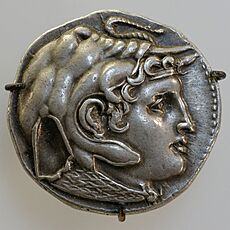
Ptolemy was born in 367 BC in Macedon. His mother was Arsinoe of Macedon. His father was Lagus, a Macedonian noble. Ptolemy was one of Alexander's seven personal bodyguards. He played a key role in Alexander's later campaigns. These included battles in Afghanistan and India.
Ptolemy fought in the Battle of Issus. He led troops on the left side of the army. He also went with Alexander to the Oracle in the Siwa Oasis. There, Alexander was called a son of Zeus. Ptolemy led his first independent command against the rebel Bessus. Bessus was captured and given to Ptolemy, who then handed him over to Alexander.
Becoming King of Egypt
When Alexander the Great died in 323 BC, his huge empire was divided. Ptolemy was given control of Egypt. This was under the names of the kings Philip III of Macedon and Alexander IV of Macedon. Ptolemy quickly took control of Cyrenaica as well.
It was a Macedonian custom for new kings to bury the old one. Ptolemy wanted to prevent Perdiccas, who was ruling the empire, from claiming the throne. So, Ptolemy worked hard to get Alexander's body. Alexander had wanted to be buried in the Siwa Oasis. But his generals, including Perdiccas, planned to bury him in Macedon.
In 322 or 321 BC, Alexander's body was in Syria. Ptolemy I captured it and brought it to Egypt. He first buried it in Memphis. Later, it was moved to Alexandria into a new tomb. Soon after this, Ptolemy openly joined a group against Perdiccas. Ptolemy also had Cleomenes, his deputy, executed. This removed a major obstacle to his power.
Wars with Other Generals
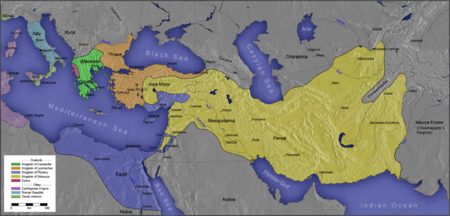
Other: Carthage Rome Greek colonies
In 321 BC, Perdiccas tried to invade Egypt. But his army failed to cross the Nile River. Perdiccas lost 2,000 men. This failure ruined his reputation. He was then murdered by his own officers. Ptolemy immediately helped Perdiccas's former army with supplies. He was offered the chance to rule the empire, but he said no. Ptolemy always focused on making Egypt strong. He did not want to risk everything to rule Alexander's entire empire.
In the long wars that followed, Ptolemy had two main goals. First, he wanted to keep Egypt safe. Second, he wanted to control nearby areas. These included Cyrenaica, Cyprus, and Syria (including Judea). He first took Syria in 318 BC. He also protected the small kingdoms of Cyprus.
When Antigonus I, another powerful general, became too ambitious, Ptolemy joined a group against him. Ptolemy had to leave Syria during the war. But he fought Antigonus's supporters in Cyprus and took the island back in 313 BC. A rebellion in Cyrene was also stopped that same year.
In 312 BC, Ptolemy and Seleucus invaded Syria. They defeated Demetrius I, Antigonus's son, at the Battle of Gaza. Ptolemy took Syria again. But after a few months, he left it when Demetrius won a battle and Antigonus arrived with a large army. In 311 BC, a peace agreement was made. Soon after, Alexander IV, the young king, was killed. This left Ptolemy as the true ruler of Egypt.
The peace did not last long. In 309 BC, Ptolemy learned that his ally Nicocles of Paphos planned to join Antigonus. Ptolemy sent agents and his brother Menelaus to deal with the situation. They surrounded Nicocles's palace and forced him to take his own life. In 308 BC, Ptolemy led his fleet to take coastal towns in Lycia and Caria from Antigonus. He then went to Greece and took control of Corinth, Sicyon, and Megara.
In 306 BC, Demetrius attacked Cyprus with a large fleet. Ptolemy's brother Menelaus was defeated and captured in the Battle of Salamis. Ptolemy lost Cyprus completely.
Antigonus and Demetrius then called themselves kings. Ptolemy, along with other generals like Cassander, Lysimachus, and Seleucus I Nicator, did the same. In the winter of 306 BC, Antigonus tried to invade Egypt. But Ptolemy was strong there and successfully defended his border. Ptolemy did not lead any more attacks against Antigonus overseas. However, he sent much help to Rhodes when Demetrius attacked it (305/304 BC). The people of Rhodes honored Ptolemy like a god for lifting the attack.
When the generals formed a new group against Antigonus in 302 BC, Ptolemy joined. He invaded Syria a third time. But when he heard a false report that Antigonus had won a big victory, he left Syria again. However, Antigonus was actually defeated and killed by Lysimachus and Seleucus at the Battle of Ipsus in 301 BC. Ptolemy then took Syria for the fourth time.
The other generals had given all of Syria to Seleucus. This was because they thought Ptolemy had abandoned them. For the next 100 years, the control of southern Syria (Judea) caused many wars between the Seleucid dynasty and Ptolemaic families. After this, Ptolemy mostly stayed out of fights between other generals. He lost his lands in Greece but took back Cyprus in 295/294 BC. Cyrenaica had many rebellions. It was finally brought under control around 300 BC. Ptolemy placed his stepson Magas in charge there.
Family and Successor
Ptolemy had three children with his partner Thaïs: Lagus, Leontiscus, and Eirene. Eirene later married a ruler in Cyprus. Ptolemy also married Artakama, a Persian noblewoman, as Alexander the Great had ordered.
Around 322 BC, he married Eurydice, whose father was a Macedonian ruler. They had five children. These included three sons: Ptolemy Ceraunus, who became king of Macedon; his brother Meleager, who also ruled Macedon briefly; and another son who caused trouble in Cyprus. Their daughters were Ptolemais and Lysandra.
Ptolemy then married Berenice, who was Eurydice's cousin. Berenice came to Egypt as Eurydice's lady-in-waiting. Ptolemy and Berenice had three children: Arsinoe II, Philotera, and Ptolemy II. Their oldest child, Arsinoe, married three times.
In 285 BC, Ptolemy made his son Ptolemy II a co-ruler. His oldest son, Ptolemy Keraunos, left Egypt. Ptolemy I died in January 282 BC, when he was 84 or 85 years old. He was a smart and careful ruler. After 40 years of wars, he left behind a strong and well-organized kingdom. He was known for being kind and generous. This helped him gain the loyalty of Macedonian and Greek soldiers. He also tried to get along with the native Egyptians.
Ptolemy was a big supporter of learning. He founded the famous Great Library of Alexandria. The Ptolemaic dynasty he started ruled Egypt for almost 300 years. It was a Hellenistic kingdom, and its capital, Alexandria, became a major center of Greek culture. Ptolemaic rule ended with the death of Cleopatra VII in 30 BC.
Historian and Writer
Ptolemy himself wrote a history of Alexander's military campaigns. This book is now lost. However, a writer named Arrian used Ptolemy's history as one of his main sources for his own book, Anabasis. So, many parts of Ptolemy's history are likely found in Arrian's work. Arrian said that Ptolemy was a very trustworthy source. This was because Ptolemy was with Alexander during the campaigns. Also, Ptolemy was a king himself, so lying would be more shameful for him.
For a long time, Ptolemy's lost history was seen as fair and honest. But more recent studies suggest it might have been biased. Some historians believe Ptolemy wrote to make himself look good. They also think he tried to make Perdiccas, a rival, look bad. For example, Arrian's story of the fall of Thebes in 335 BC (which Arrian said came from Ptolemy) is different from other accounts. In Ptolemy's version, Perdiccas plays a less heroic role. However, other historians argue that this bias might be exaggerated.
Ptolemy and Euclid
Ptolemy personally supported the great mathematician Euclid. Ptolemy found Euclid's famous book, the Elements, too hard to study. So, he asked Euclid if there was an easier way to learn it. According to an old story, Euclid famously replied: "Sire, there is no Royal Road to geometry." This means there is no easy shortcut to learning difficult subjects.
Ptolemy in Art and Stories
- Ptolemy is played by Anthony Hopkins and Elliot Cowan in the movie Alexander, directed by Oliver Stone. He is the narrator and a main character.
- Ptolemy appears as a small character in Mary Renault's Alexander Trilogy novels.
- Ptolemy is a character in the mobile game Fate Grand Order.
- Dino Kelly plays Ptolemy as a character in the 2024 Netflix show Alexander: The Making of a God.
See also
 In Spanish: Ptolomeo I para niños
In Spanish: Ptolomeo I para niños
- History of Ptolemaic Egypt
- Serapis, a Greco-Egyptian god promoted by Ptolemy


